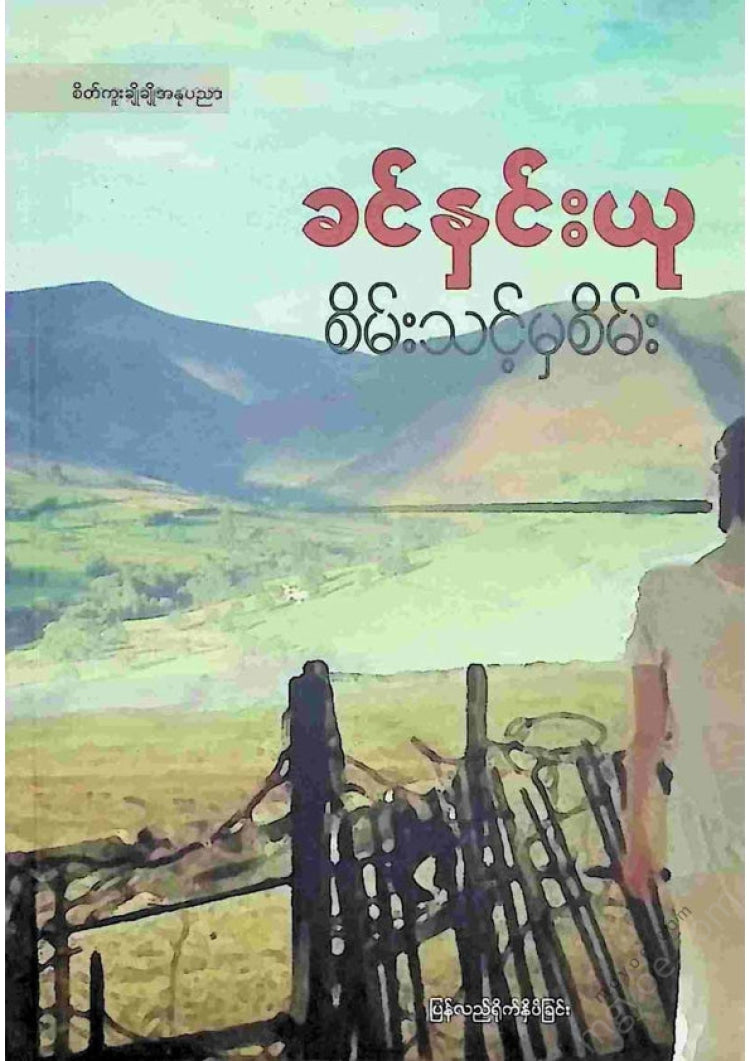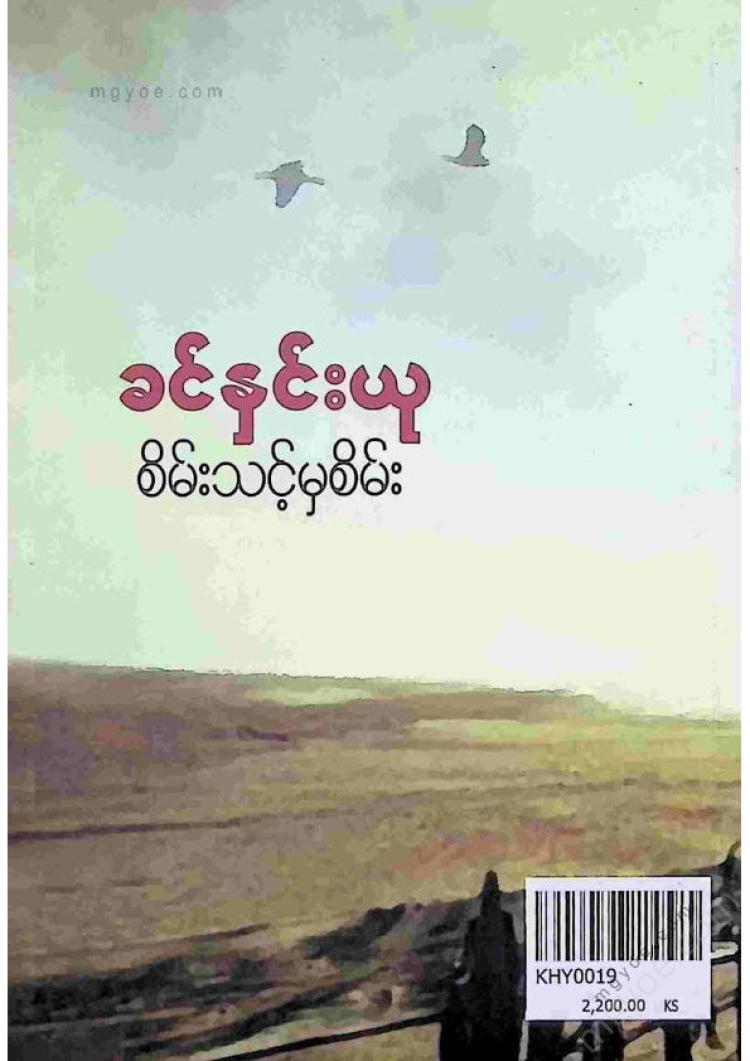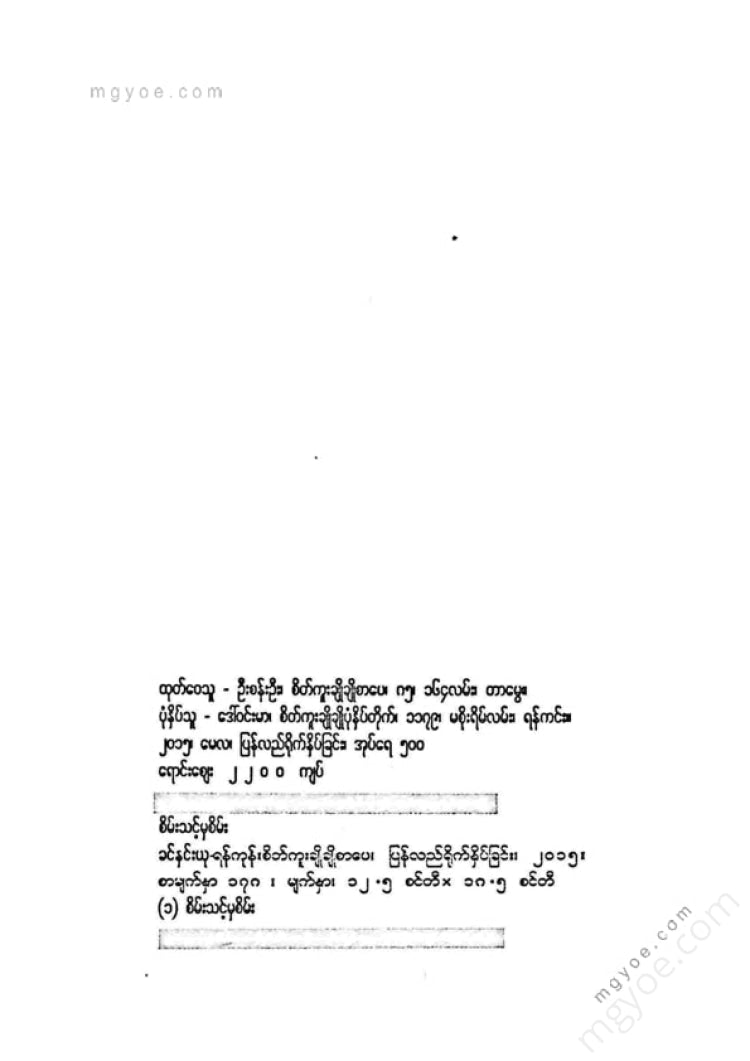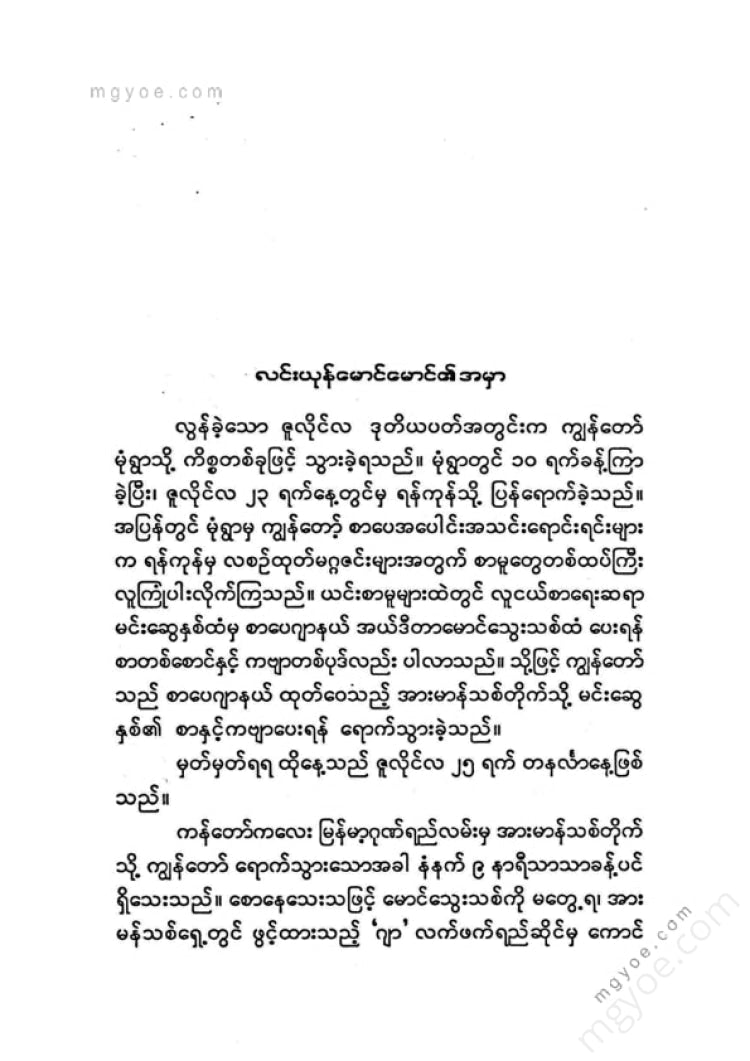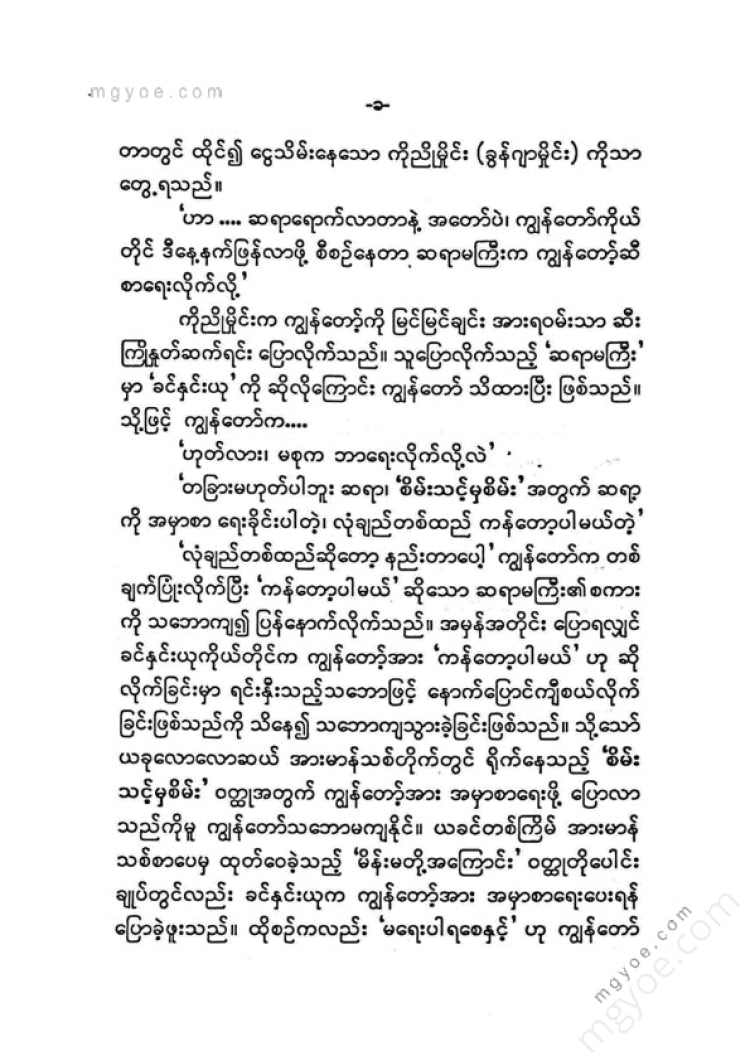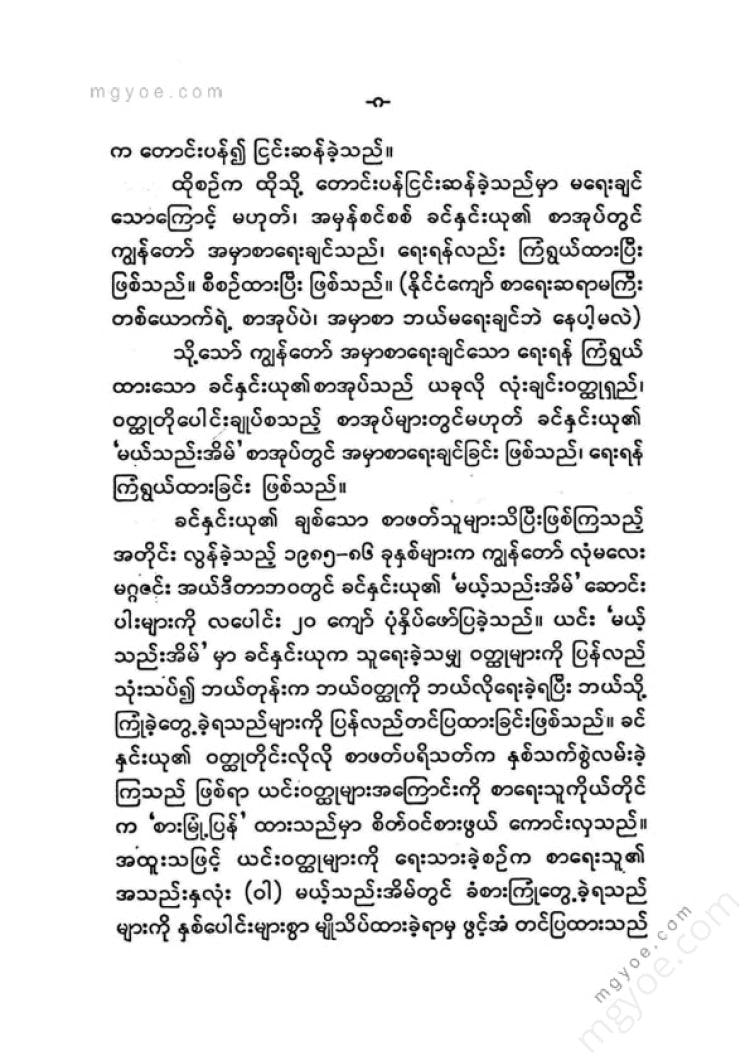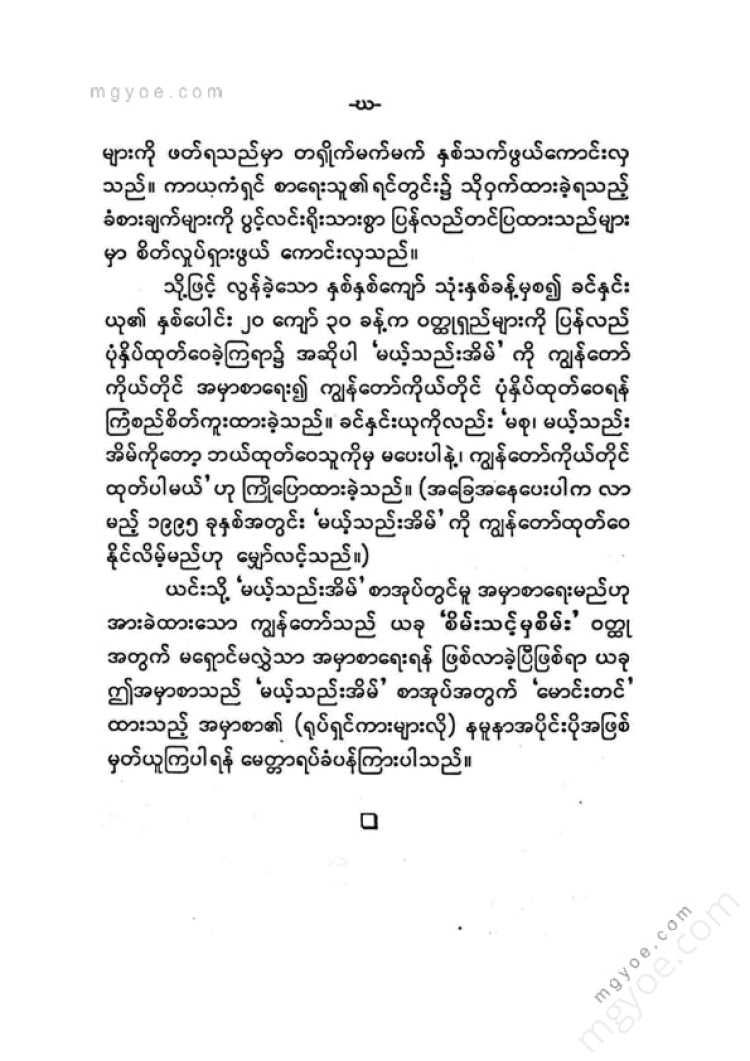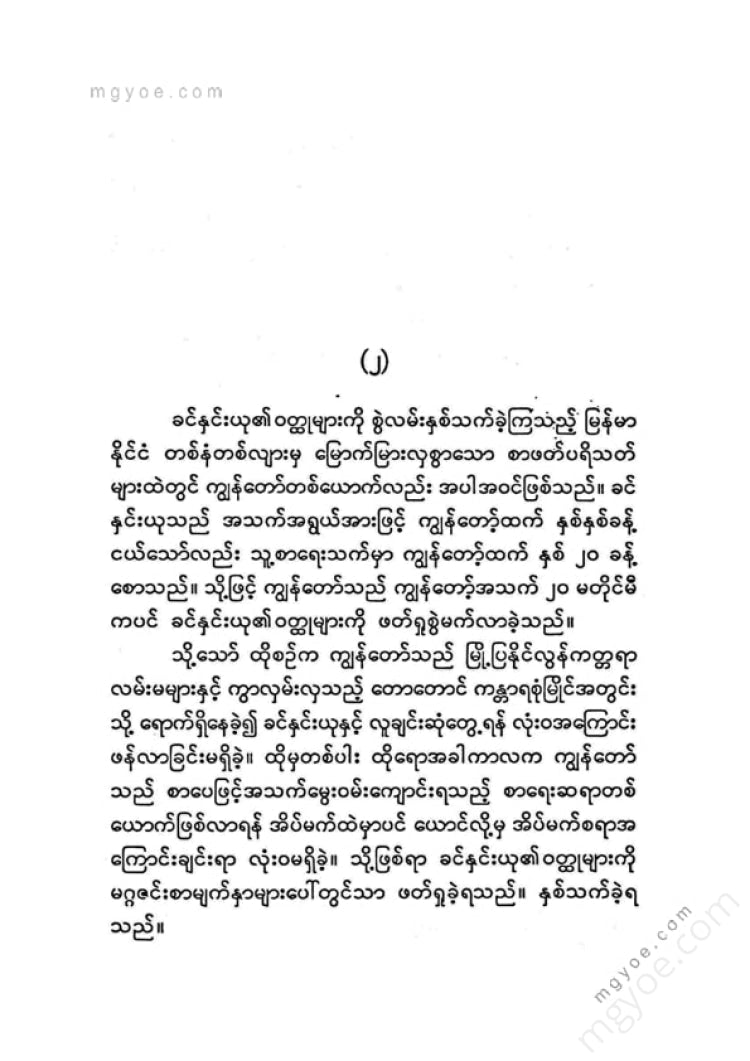စိတ်ကူးချိုချိုစာပေ
Khin Hnin Yu - Green is green
Khin Hnin Yu - Green is green
Couldn't load pickup availability
Green from Green or Love from Greatness
After the elephant, Kethar
I'm happy again.
The village is very popular.
They will moan.
Do you even play the piano?
Like a daughter, like a sister
Many people are indifferent.
I heard you say that.
That old song is the song my mother sang to me.
It is a song. When I wrote the novel "Sean Tae Thu Sean", I used it in the second part.
Around 1952, I was on a trip to northern Shan State. On my way from Lashio to Namtubaw Dwin by car, I had to cross the Mong Ngao River. Near the village of Mong Ngao, there was a stream that we had to cross by raft. While the first group of people were crossing the stream with their belongings, I stopped for a moment in a small hut a short distance from the bank. Inside the hut, I met the woman who owned the hut.
Her husband was the one who led the raft to the other side. We call him the ferryman. I don’t know what he is called in Shan State. He was poor and his hut was very old. His beloved wife welcomed me with hot water from an earthen pot. The bowl was a yellow glazed earthenware bowl. A baby was sitting on the back, and the two older ones were sitting next to him. The older one was about five years old and the younger one was about three years old, and they were serving their mother bread.
"I'll give them some bread, sister."
"He got up lightly and brought down three packages of bread wrapped in rice paper from the earthenware pot on the counter. He gave two packages to the children and unwrapped the other one and gave it to me."
"They feed me. Inside the leaves, I see black beans like velvet beans. Eat, sister, and drink some hot water. This is all the food for the child here. Sometimes they boil potatoes. They also feed me sticky rice. Behind the hut, his father has planted a potato field and a bean field. It is enough for the children's mouthwash and for us to eat."
I briefly describe his life. At that time, there was a lot of rain in that place. I lived a long way from one hut to another, with small fields between the small huts.
I am interested in the environment, which is not even called a village.
"They planted the field when their father was sick. I looked after it later. Sometimes I have to go to the market in Mong Ngoa to buy it if I want it."
The children, who were eating with their cheeks puffed up, seemed to be in perfect health, not thin or fat. They seemed to be healthy because they were eating fresh air and fresh fruits. Their clothes were very poor. The woman did not seem to be from Shan State. She did not speak fluently. Her husband was a Shan man. He seemed to have been called by love. "I ate boiled beans and drank green water and said thank you," she said.
“Where do you put them in school?” he asked. The young woman didn't seem to mind the word school. She didn't think she had ever taught herself.
When we got up to cross the stream, the young woman walked me to the bank of the stream and greeted me. Her husband took us to the other side. I thanked him and said goodbye, and continued on my journey. The fields and huts in the hills and valleys of Shan State kept drawing my attention. I also planned to educate the children in these fields. I wanted to educate the children so that they could become Shan youth who could lead their fields to modern agriculture. In my dream, the sound of a water pump driving to irrigate the fields far from the river and stream was deafening. In my heart, I felt the white snow of winter, the blankets of
Below, the sleeping fields lie.
In 1954, I published "From Green to Green" in Shuma. I created what I wanted to be in my mind in a novel. I took a lady named Green from Yangon to the bank of the Mong Ngo village.
The story of how Sein ended up in the forest is a bit strange. Six months after her marriage, she and her husband were traveling in northern Shan State when they were robbed near Mong Ngao. Before the car could stop, Sein opened the door and rolled down. She fell from the car into a ravine. The robbers took her husband and the car away. A Shan old man rescued Sein, who was unconscious, from the cliff and bushes, and Ko Wunna and her family arrived at the forest.
Ko Wunna's mother, sister Ma Kham Lone, younger brother Toe Gyi and Atu warmly welcomed the unexpected newcomer. Ko Wunna also took special care of him. Upon arrival, Sein, who was unable to get out of bed due to a fall from the car and a fever, recovered from his injuries and recovered from the love of Ko Wunna's warm family.
When Sein was well, he told her about his condition and planned to return to Yangon. Whenever Ko Wunna went to Mong Ngow and Kyaukme, she would always check on Sein’s husband. One day, Ko Wunna went to Kyaukme and brought a newspaper. The newspaper reported that Sein’s husband, Ko Win Pe, had been killed by a robber, and there was a photo of his mutilated body and belongings in Ko Win Pe’s briefcase. Ko Win Pe’s parents did not approve of Sein’s marriage to Ko Win Pe, so they cut off contact. Sein has no parents. He has no close relatives.
Mother begged him to stay in the farm, as he would be alone in Yangon and live alone. Since Sein had not prepared anything for his life and was not ready to return to Yangon, Mother agreed to let him stay in the farm. The children also loved Sein. Ko Wunna was very happy.
Sein is a skilled marriage counselor and is a great help to Mom. Sein's arrival has made Mom's farm clean and tidy. Toe Gyi's farm has also increased in number and the cowshed has produced more milk. Ma Kham Long's chicken farm has also produced more eggs. Sein helps Ma Kham Long and Toe Gyi with everything from cleaning the chicken farm to the cowshed.
Ko Wunna saved money to buy a water pump for the expanded farm. However, to protect the weather, he demolished the small hut and built a stone house for Sayen. Later, he planned to gradually buy a water pump. Sayen neatly built a small hut and bamboo from the hut he demolished near his house and used it as a school. With the help of his neighbor U Khun Naung, he gathered the children living around the farm and taught them in their free time with Ma Kham Lone and Toe Kyi Atu. Toe Kyi would bring the newspaper from Mong Ngoa while he was delivering milk and taught them to read the newspaper at night.
They are happiest when they take a bath in the winter at night, enjoying the hot water. Before, my mother was the only one who was old and could not do much work. When the green tree came, it was the green tree that provided the water for the whole family, along with the firewood they had collected.
During the lunch break for Ko Wunna, they ate Sein's homemade tofu salad and pudding made with milk and eggs. Ko Wunna was happy with Sein's behavior. At night, they read and talked by the fire in the house. One night, Sein brought a large newspaper and showed Ko Wunna a blank advertisement. Ko Wunna said that he didn't know anything.
Ko Wunna lived in the mountains and studied as a child, but as an adult, he moved to the plains and joined the Burmese patriotic youth in the anti-colonial revolution. After independence, when his father died, he brought his mother's family back to the farm that his mother loved, and he worked in agriculture and livestock to support his family.
One day, Ko Wunna woke up late and went out to the field late. The green one said -
"What's wrong with you, Kowanna? I woke up late this morning."
Ko Wunna opened up and told me about his thoughts that night.
“I can’t sleep, I think about you all night. I wonder if you will leave this farm one day, and I also think about Yasho. I don’t want to rely on the landlords. I want to improve the farm myself. I want to develop the barren land and expand the farm with a water pump on the hill. I want you to always be by my side so that I can work hard. I want to live with you.
I have more work to do. I also have a consultant. And like the other day, when I come back from the farm, I make tofu salad, and when I come back from the farm at night, I take a warm bath with hot water. All the small things that I take care of are very important to me. To be honest, I can't separate myself from the farm. I want to work with the farm and settle down in the farm. I want to see my descendants in this new farm with new ideas and new views and in the middle of the progressive fields. But I don't want to waste my life on this farm. I can't separate myself from the farm either. I don't want to separate myself from the farm, I will go and have a restless night.
Saying this, Ko Wunna left for the forest.
The green one was also shocked by Ko Wunna’s polite and young words. Indeed, for a young man like Ko Wunna, who had been living together for so long, his care was inspiring. As a benefactor, he was taking care of his mother and family with a family spirit. He had always planned to go to Yangon one day and check on his beloved husband, Ko Win Pe. When Ko Wunna opened up like this, he began to remember Ko Win Pe especially. He felt sad in his heart, remembering his husband, and to calm down, he went into Ko Wunna’s room and tidied up the books. He tidied up the books and papers that had been in disarray since the stone house was built.
